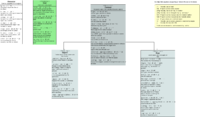Difference between revisions of "Sugar Network/Resources"
m |
|||
| Line 51: | Line 51: | ||
'''Context.type''' | '''Context.type''' | ||
| − | |||
* ''activity'', Sugar activity; | * ''activity'', Sugar activity; | ||
* ''book'', books in various forms; | * ''book'', books in various forms; | ||
| − | * '' | + | * ''talks'', offline discussion groups; |
| + | * ''project'', general purpose context to group related Post objects; | ||
* ''package'', GNU/Linux package metadata. | * ''package'', GNU/Linux package metadata. | ||
| + | |||
| + | Context type specifies how context, and all related resources, can be used. For example, ''activity'' type assumes activity bundles uploaded to the ''Context.releases'' property, or, ''project'' contexts might have associated ''issue'' type Post objects. | ||
<div id="context-releases"></div> | <div id="context-releases"></div> | ||
| Line 74: | Line 76: | ||
* ''topic'', general purpose top-level Post; | * ''topic'', general purpose top-level Post; | ||
| − | |||
* ''review'', review the Context (topic); | * ''review'', review the Context (topic); | ||
| − | * '' | + | * ''artefact'', object generated by Context application (topic); |
* ''question'', Q&A request (topic); | * ''question'', Q&A request (topic); | ||
| − | * '' | + | * ''issue'', problem with the Context (topic); |
* ''idea'', an idea for the Context (topic); | * ''idea'', an idea for the Context (topic); | ||
| − | * '' | + | * ''notice'', auto-generated Post for updates within the Context (topic); |
| − | * '' | + | * ''post'', general purpose dependent Post; |
| − | * '' | + | * ''solution'', solution for question, issue, or, idea (post). |
Revision as of 16:26, 26 May 2014
The following diagram shows the full list of objects implemented by the Sugar Network API.
Property types
Generally, Sugar Network objects' property types correspond to JSON types. The only exceptions mentioned in the following list:
- enum, is an enumerated type when a value is a string from the predefined list of constants;
- markdown, is a string formatted in the Markdown syntax;
- blob, is a file represented by string value which is a SHA-1 digest of file's content; the file itself can be obtained from the
GET /blobs/DIGESTrequest; - aggregated, is a list of JSON objects which has special API to treat its items; each aggregated item has a unique identifier; items might be created not only by the object's authors.
Resource.author
A dictionary of authors working on the corresponding resource. Keys are Sugar Network User guids, or, if particular author is not registered in the Sugar Network, full user names. Values are dictionaries with the following keys:
- name
Full author's name; - role
An integer which is a bit-wise ORed value of the following constants:- 0x1, author is registered in the Sugar Network (and guid key is set);
- 0x10000, author is the original author of the corresponding resource; if it is not set, user is only a maintainer, e.g., an uploader of a book which has its original authors.
Resource.status
This is a system level property which can be set only by node editors. It is a list of "badges" editors set depending on the object quality. Currently supported statuses are:
- featured, the object is popped up by node editors.
Resource.pins
This property makes sense only for objects provided from a local proxy. The property is intended to store local user's preferences or statuses remote object has in local environment. Currently supported values are:
- favorite, set if a user has "stared" the object;
- checkin, applied to Context objects only, set if a user has "pinned" the context to keep its most recent version permanently in the local system;
- stale, applied to Context objects only, set if previously checked-in Context might have more fresh releases on the node; it is not possible to filter Contexts by this value;
- inprogress, applied to Context objects only, set if the Context is in the process of downloading content from the node; it is being temporally set before launching the Context or checking it in; it is not possible to filter Contexts by this value.
Context.type
- activity, Sugar activity;
- book, books in various forms;
- talks, offline discussion groups;
- project, general purpose context to group related Post objects;
- package, GNU/Linux package metadata.
Context type specifies how context, and all related resources, can be used. For example, activity type assumes activity bundles uploaded to the Context.releases property, or, project contexts might have associated issue type Post objects.
Context.releases
Contexts with activity or book types might have releases, i.e., activity or book versions that users can download. The releases property is aggregated where each item describes one particular version. There is no need in working with the releases property directly, there are high-level API commands to upload and download releases.
Post.topic
Post objects might belong to a topic post. The system design assumes only a two-level Posts hierarchy.
Post.type
- topic, general purpose top-level Post;
- review, review the Context (topic);
- artefact, object generated by Context application (topic);
- question, Q&A request (topic);
- issue, problem with the Context (topic);
- idea, an idea for the Context (topic);
- notice, auto-generated Post for updates within the Context (topic);
- post, general purpose dependent Post;
- solution, solution for question, issue, or, idea (post).
